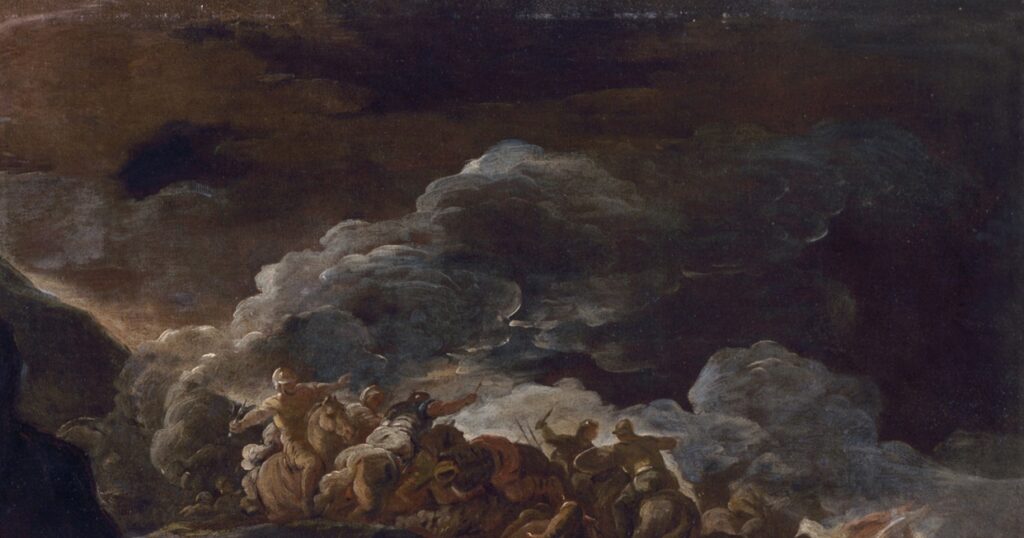A literary reflection by Amy Lakeman on C.S. Lewis's The Last Battle. This is one installment of a monthly series providing reflections on works of literature from a Lutheran perspective.
A charlatan sits in power. Division and cynicism have won the hearts of the people. Foes at home and abroad are cunning. The nation feels sullied. Such is the situation facing Tirian, the last king of Narnia.
In C.S. Lewis’s The Last Battle, the beloved land of the famed children’s series is under attack. Narnia’s enemies, the Calormenes, have taken over the country. Through treachery, they have fooled loyal Narnians into believing that Aslan — Narnia’s Christ figure — is on their side. Fear and confusion prevent Narnians from coming to Tirian’s aid.
In rapid succession, Tirian receives blow after blow of bad news. He encounters a group of once-loyal subjects, among whom Calormene lies have spawned total disbelief. A messenger delivers the chilling revelation that his home fortress is overrun. The emissary he sent to bring reinforcements has been slain. “So,” says Tirian after a long silence. “Narnia is no more.”[i]
Power, fear and cynicism in an age of woe
This election season, American Christians of all political stripes may find it discouragingly easy to relate. We face major policy disagreements, cross-partisan social differences, and leaders who have failed to live up to our ideals. Certainly, Tirian’s situation is more dire than our own, but his struggles resonate more than we would like.
In Tirian’s Narnia, enemies claim to speak for Aslan. Yet they are allied with the duplicitous, the distasteful, and the “just plain wrong.” The talking beasts of Narnia no longer know whom to trust. When an innocent lamb points out the plain truth that this alliance simply does not reflect Aslan’s character, he is dismissed with an ad hominem attack. Half-truths stoke doubt and confusion.
In our world too, political division has a disturbing potential to undermine the truth.[ii] When multiple groups make completing claims to the moral high ground, which can be trusted? Some politicians have made a point of calling facts into question, sowing doubt about the reliability of all information. There seem to be two “spins” to every story, two narratives about our nation’s culture, and even two different interpretations of reality.
This confusion brings strong temptation to double down on our own partisan “side” and its version of events. Lewis writes elsewhere that we all wish to be part of an “inner ring,”[iii] a group that is “in the know” to the exclusion of others. Social polarization makes this especially enticing, as we readily believe the worst of our neighbor from the other political party, rather than “the best construction.”[iv] Like The Last Battle’s Ginger the Cat, we decide to throw our lot in with those who have the strongest will to power. Partisan extremity feeds our sinful flesh’s appetite (Rom. 7:22–25; 8:7), and we are easily ensnared by anger, malice and pride.[v]
Or perhaps we grow weary of trying to sort out right from wrong. There is too much uncertainty, too much negativity. We become exhausted and apathetic. It is difficult and dangerous to keep up with the twists and turns of daily bad news. Like the fearful and discouraged Narnian crowd, we slink back into the woods, hoping to wait out the conflict in safety.
Maybe the continual barrage on the truth has an even more pernicious effect: We begin to question everything. Perhaps there are no such things as “right” or “wrong” after all. We become jaded and cynical, like the dwarves Tirian frees from Calormene captivity: “The Dwarfs all looked at one another with grins; sneering grins, not merry ones. … ‘I don’t know how all you chaps feel, but I feel I’ve heard as much about Aslan as I want to for the rest of my life. …We’ve been taken in once and now you expect us to be taken in again the next minute. …We’re on our own now. … The Dwarfs are for the Dwarfs.’”[vi]
When sincerity feels too vulnerable, we arm ourselves with sarcastic barbs and cynical disrespect for all those in power. Perhaps their side and ours are one and the same. Who cares, as long as we get what we are due?
A kingly response: honor and bold action
Thus the Narnians’ reactions are our own. We become the power-driven Cat, the fearful crowd or the cynical dwarves. Yet in King Tirian’s response to Narnia’s decline, we see a better way.
Just as Tirian’s problems run parallel to ours, his Aslan-following example can inspire us in the political realm: Tirian behaves honorably, acts boldly, and entrusts his fate to Aslan.
Tirian’s honor can be our first watchword, protecting us from the pursuit of raw power as a solution to cultural fears. Throughout the novel, his first care is to “behave like a Narnian.” He adheres to the norms of behavior he has set out for himself as a king, even when it places him in a position of weakness. When he attacks foes without warning, he is filled with regret, despite the fact that they are in league with his enemies and his situation is dire. His example encourages Christians to protect norms of political decency — including the Christian virtues of charity and humility — and the institutions they uphold, even when it means short-term loss. After all, Satan relishes victories in our hearts in addition to those in our culture.
Despite Christlike humility, Tirian also behaves boldly when the situation calls for it. In contrast to his frightened subjects, he is happiest when taking action to restore truth. During the pivotal battle, Tirian bides his time, attempting to strike at the best moment. Ultimately, he enters the fray in defense of a loyal subject: “When Tirian saw that brave Beast getting ready to fight for its life … something seemed to burst inside him. He no longer cared if this was the best moment to interfere or not … and cried in a great voice … ‘To my side, all true Narnians’.”[vii]
Though it can feel paralyzing to know how and when to engage contentious contemporary politics, a Christian is called to engage.[viii] When it is easier fall back in silence or fear, we can recall our vocation as citizens and advocate for the good in the public square. When it seems there are no right answers in the voting booth, we can –- as Luther advised — “sin boldly” rather than become paralyzed. When the truth seems murky, we can educate ourselves[ix] rather than react with kneejerk partisanship, for as Lewis points out, “God is no fonder of intellectual slackers” than any other kind.[x]
Balancing humility against bold action does not come easily. Yet as Tirian highlights, this is the work of a warrior. “No warrior scolds,” he instructs. “Courteous words or else hard knocks are his only language.”[xi] By embracing the duality of honor and action, Tirian displays the best aspects of the chivalrous tradition Lewis loved,[xii] attributes sorely lacking in a political discourse defined by vitriol.
Even when the dwarves reach the zenith of their treachery, turning their bows against their fellow Narnians, still Tirian eschews hopelessness. Tirian cares deeply for the fate of his world, but never falls into cynicism, no matter how fierce the struggle. As Lutherans Christians, we are well-practiced at dwelling within tensions. With Tirian, we embrace an unshakeable hope, even when current circumstances look bleak. Anchored in the everlasting (Heb. 6:19), we balance humble honor and bold action in the present, entrusting our failures to Christ.
A land fit for kings
After all, it is only through Christ that we can aspire to Tirian’s kingly manner at all. In His death and resurrection, He “gave us a spirit not of fear but of power and love and self-control” (2 Tim. 1:7). He has transformed us from power-hungry, fearful or cynical slaves into sons and daughters of the True King (Rom. 8:15). In Him, we rest securely, taking whatever adventure Aslan would send us.[xiii]
Indeed, when all hope is lost and defeat by the Calormenes is certain, Tirian passes through the Door to unexpected life, light and freedom. Though Narnia has ended, the greatest adventure awaits Tirian and his subjects in the New Narnia of Aslan’s creation, which will never come to a close.
In this time of political strife, the trials of our earthly nation rightly sadden us. Love of country is a good thing when placed under love of Christ.[xiv] Yet we take comfort in the fact that “we are all between the paws of the true Aslan.”[xv] Anything we love about our temporal country, we love only because it looks like the Eternal Country to which we are called.
With Tirian and his beloved friends, as we battle for the good in this age and look forward to the good in the next, we can cry: “The light is dawning, the lie broken.”[xvi]
[i] C.S. Lewis, The Last Battle, 1956, in The Chronicles of Narnia (New York: Barnes & Noble, Inc., 2010), 717.
[ii] “U.S. Media Polarization and the 2020 Election: A Nation Divided,” Pew Research Center, Jan. 2020, pewresearch.org/journalism/2020/01/24/u-s-media-polarization-and-the-2020-election-a-nation-divided.
[iii] Lewis, “The Inner Ring,” in The Weight of Glory, 1949 (New York: HarperCollins, 2001), 141.
[iv] Martin Luther, Large Catechism, “The Eighth Commandment” in Concordia: The Lutheran Confessions (St. Louis: Concordia Publishing House, 2006), 289.
[v] Lewis, The Screwtape Letters, 1942 (New York: HarperCollins, 2001), 32.
[vi] The Last Battle, 706-707.
[vii] The Last Battle, 729.
[viii] See Joel Biermann, Wholly Citizens (Minneapolis, Fortress Press), 2017.
[ix] For educational resources in this area, consider researching the bias of various media sources (allsides.com/media-bias/media-bias-chart), reading across an array of sources, or relying on a Christian news aggregator like “The Pourover” (thepourover.org).
[x] Lewis, Mere Christianity, 1952, in The Complete C.S. Lewis Signature Classics (New York: HarperCollins,2002), 71.
[xi] The Last Battle, 733.
[xii] Lewis, “The Necessity of Chivalry,” 1940, in Present Concerns (New York: HarperCollins, 1986), 3.
[xiii] The Last Battle, 719.
[xiv] Lewis, The Four Loves, 1960 (San Diego: Harcourt, Inc., 1991), 22.
[xv] The Last Battle, 726.
[xvi] The Last Battle, 706.
Cover image: “The Battle of Israel and Amalek,” Luca Giordano, 1634-1705.






Awesome analogy! Thank you.